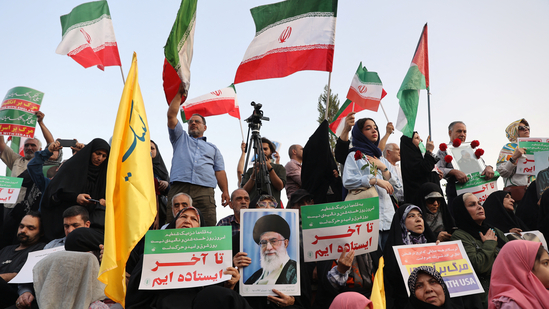
- The ceasefire is viewed as fragile and temporary without strong mechanisms to enforce it.
- These violations demonstrate the fragility of ceasefires when non-state actors are involved in a conflict.
- President Donald Trump is receiving mixed global reactions, with some praising him for helping to avoid escalation, while others criticise him for acting unilaterally.
On 24 June 2025, Iran and Israel agreed to a ceasefire after 12 days of military conflict between them. This ceasefire was mediated and announced by the President of the USA, Donald Trump, who had held emergency talks with both sides. The conflict has escalated quickly after Israel struck Iran in pre-emptive strikes to stop the latter from developing its nuclear program. The nuclear program posed a direct threat to Israel. Iran has retaliated promptly to these strikes, which led to growing fears of a regional war in the Middle East.
While the announcement of a ceasefire was expected to relieve tensions, missile attacks were reported hours later, which included strikes in Beersheba in Southern Israel and US military bases in Qatar, allegedly by Iran-backed militias. These violations cast a huge doubt about the credibility of the truce, with uncertainty about whether Iran can control its allied non-state actors. The announcement of the truce certainly brought a sense of relief amongst all actors involved; however, its fragile nature can’t be overlooked, which suggests that the risks of renewed conflicts remain high.
The ceasefire, which was announced by Trump, came a few days after the USA bombed key nuclear development sites in Iran, namely, Fordow, Natanz, and Isfahan. This led analysts to believe that Iran may take a huge retaliatory step to attack the USA back. Iran, in response, bombed US military bases in Qatar. These actions posed a threat of escalation of the conflict to the whole region. On the very next day, President Donald Trump announced the ceasefire. The terms included halting direct missile strikes and stopping support to allied militias. However, hours after the ceasefire was to come into effect, there were strikes in Israel and US bases in Qatar, which were carried out by Iran-backed militia groups, operating from Lebanon, Syria or Iraq. Amid this, Israel remains on high alert, viewing the attacks as an act of violation of the ceasefire. These violations demonstrate the fragility of ceasefires when non-state actors are involved in a conflict.
At the same time, the NATO summit is taking place in the Hague, which is dominated by discussions on the Iran-Israel ceasefire. European leaders have expressed concern over the durability of the truce. The UK Prime Minister has called for a broader, multilateral peace process involving international observers. Some other NATO members support the deployment of neutral mediators to oversee ceasefire violations. President Donald Trump is receiving mixed global reactions, while some are praising him for helping to avoid escalation, others are criticising him for acting unilaterally. The United Nations has called for restraint and emphasises the need for a sustainable diplomatic solution.
The ceasefire is viewed as fragile and temporary without strong mechanisms to enforce it. Experts warn of renewed hostilities if missile attacks and attacks by allied militias continue. Long-term agreement may require IAEA access to Iran’s nuclear facilities and confidence-building measures from both sides. The situation remains volatile, and diplomatic engagement must be sustained to avoid further escalation.
References:
- https://www.reuters.com/world/middle-east/trump-israel-iran-violated-ceasefire-2025-06-24
- https://www.thedailystar.net/news/world/israel-iran-conflict/news/us-starts-war-iran-bombing-key-nuclear-sites-3922716
- https://www.reuters.com/business/energy/oil-prices-edge-higher-investors-assess-iran-israel-ceasefire-2025-06-25
- https://www.reuters.com/world/europe/frances-macron-us-has-made-offer-israel-iran-ceasefire-2025-06-17
Archita Gaur is a postgraduate student at the School of International Studies, JNU. She specialises in the World Economy and has a strong interest in public policy, economic research, and governance. The views expressed are the author’s own.
